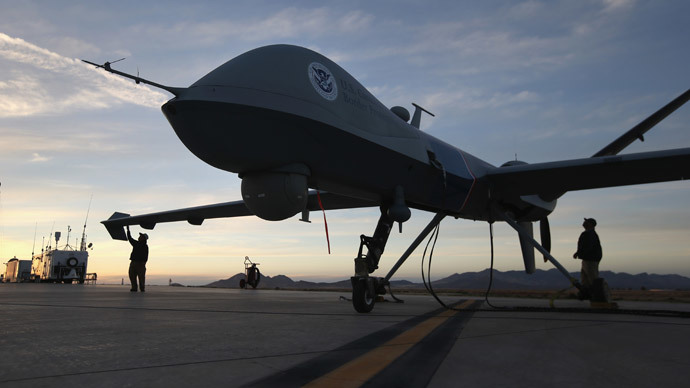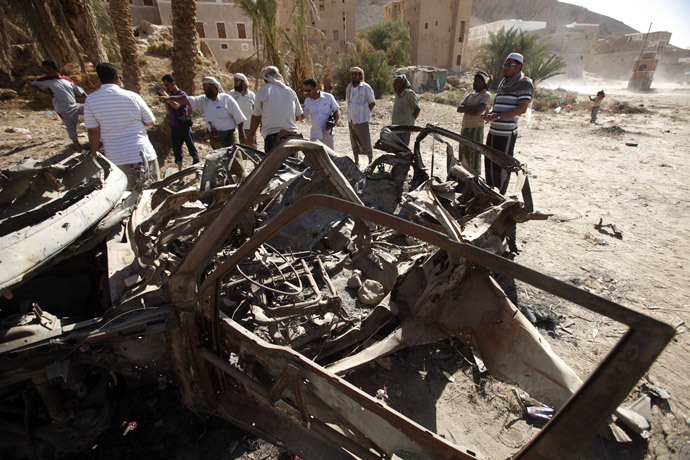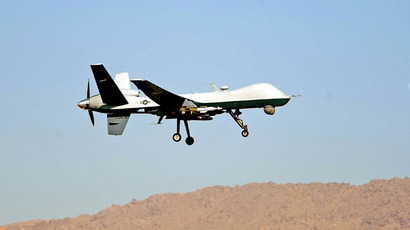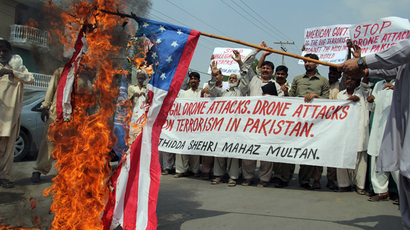UN calls for maximum transparency in drone killing reports

All cases of drone attacks in which there is even suspicion of civilian casualties must be investigated and reported with maximum transparency, a UN human rights rapporteur said. The UN identified 30 such cases that require public explanation.
The report by British lawyer Ben Emmerson details 30 attacks out of 37 initially brought to the UN’s attention conducted between 2006 and 2013, "in which there is a plausible indication that civilians were killed or sustained life-threatening injuries, or in which civilian lives were put at immediate risk."
The list of strikes delivered in Afghanistan, Pakistan, Yemen, Somalia and the Gaza strip is "illustrative rather than exhaustive" and is meant to demonstrate how much evidence the UN considers sufficient to prompt a detailed public report both from the party conducting the attack and the country in which it was conducted.
"The states responsible are under a present and continuing obligation to make public, in as much detail as possible, and subject only to such redaction as are strictly necessary to meet legitimate national security concerns, the results of any fact-finding investigations that have been conducted into the incidents identified in the present section of the report," Emmerson says. "If no fact-finding investigation has so far taken place, the Special Rapporteur considers that the states concerned are under an obligation to indicate this publicly, and provide an explanation."
The report exemplifies the handling of a February 2010 strike by US helicopters in Afghanistan, which killed up to 23 civilians and left 12 injured. The incident was investigated and findings partially declassified, revealing that attack was prompted by misleading situational information provided by crew of a Predator drone in an apparent case of "inaccurate and unprofessional reporting."
"The publication of the investigation report is a model of accountability and transparency and sets a benchmark to be followed in other cases," the UN report says calling on a similar approach taken in the 30 cases in sampled.

"It is high time that the US provided full accountability and transparency around its use of drones, and investigated civilian casualties. This report will only increase pressure on the US to bring their covert program out of the shadows," Kat Craig, legal director of the legal charity Reprieve, told the Guardian.
"In Yemen, Pakistan and elsewhere, the US, assisted by its European allies, is carrying out devastating attacks with total impunity – a practice that is terrorizing local communities and creating far more extremism than it has ever eliminated,” he added.
The UN report also updates on its activities since the previous interim report on civilian casualties of drone strikes, which the rapporteur presented in October 2013 and covered the previous year. The latest data indicates that drone use in Pakistan significantly deescalated in 2013, the report says.
"The total number of reported strikes for the year was 27, down from a peak of 128 in 2010. For the first time in nine years, there were no reports of civilian casualties during 2013. At the time of writing, there have been no reported drone strikes during 2014, the longest period without drone strikes since President Obama took office," the UN said, adding that "the cessation in strikes coincides with peace initiatives being pursued between the Government of Pakistan and the Tehrik-i-Taliban Pakistan."
In neighboring Afghanistan on the contrary a previous decreasing trend in frequency of drone strikes was reverted in 2013, with 19 confirmed attacks causing 59 civilian casualties, including 45 fatalities.
"Figures for 2013 indicate that drone strikes accounted for almost 40 percent of the total number of civilian fatalities inflicted as the result of aerial attacks by pro-Government forces." the report said. "As compared with 2012, this represents a threefold increase in the number of recorded civilian casualties from the use of drones by the International Security Assistance Force (ISAF)."
Drone attacks in Yemen also intensified in 2013, with a significant number of reported civilian casualties in the final weeks of the year. This was partially due to the December 12 attack, which targeted a wedding ceremony in Al-Bayda province and killed as many as 15 people.
The report marks that there is legal uncertainty over the use of drones outside of battlefields and that there is "an urgent and imperative need" for the international community to come to a consensus on the issue.
The UN gave Emmerson, its special rapporteur on the promotion and protection of human rights and fundamental freedoms while countering terrorism, a mandate to conduct his ongoing investigation into the civilian deaths caused by drone strikes in 2012. The results of such attacks fuel resentment in countries suffering from them and, according to experts, serve as a powerful recruitment argument for militant and terrorist groups.
The legality of drone strikes are also in question, with some legal experts saying that they violate international humanitarian law and, in some cases, laws of the perpetrating nations, as the targets of the drones are denied the right for fair trial.














